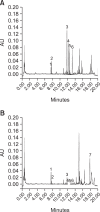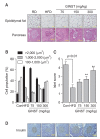Pectinase-Processed Ginseng Radix (GINST) Ameliorates Hyperglycemia and Hyperlipidemia in High Fat Diet-Fed ICR Mice
- PMID: 24116299
- PMCID: PMC3792222
- DOI: 10.4062/biomolther.2012.20.2.220
Pectinase-Processed Ginseng Radix (GINST) Ameliorates Hyperglycemia and Hyperlipidemia in High Fat Diet-Fed ICR Mice
Abstract
To develop a ginseng product possessing an efficacy for diabetes, ginseng radix ethanol extract was treated with pectinase and obtained the GINST. In the present study, we evaluate the beneficial effect of GINST on high fat diet (HFD)-induced hyper-glycemia and hyperlipidemia and action mechanism(s) in ICR mice. The mice were randomly divided into five groups: regular diet group (RD), high fat diet group (HFD), HFD plus GINST at 75 mg/kg (GINST75), 150 mg/kg (GINST150), and 300 mg/kg (GINST300). Oral glucose tolerance test reveals that GINST improves the glucose tolerance after glucose challenge. Fasting plasma glucose and insulin levels were decreased by 4.3% and 4.2% in GINST75, 10.9% and 20.0% in GINST150, and 19.6% and 20.9% in GINST300 compared to those in HFD control group. Insulin resistance indices were also markedly decreased by 8.2% in GINST75, 28.7% in GINST150, and 36.4% in GINST300, compared to the HFD control group. Plasma triglyceride, total cholesterol and non-esterified fatty acid levels in the GINST300 group were decreased by 13.5%, 22.7% and 24.1%, respectively, compared to those in HFD control group. Enlarged adipocytes of HFD control group were markedly decreased in GINST-treated groups, and shrunken islets of HFD control mice were brought back to near normal shape in GINST300 group. Furthermore, GINST enhanced phosphorylation of AMP-activated protein kinase (AMPK) and glucose transporter 4 (GLUT4). In summary, GINST prevents HFD-induced hyperglycemia and hyperlipidemia through reducing insulin resistance via activating AMPK-GLUT4 pathways, and could be a potential therapeutic agent for type 2 diabetes.
Keywords: AMP-activated protein kinase; Glucose transporter 4; High fat diet; Insulin resistance; Pectinase-processed ginseng radix.
Figures




Similar articles
-
Anti-Diabetic Effect of Pectinase-Processed Ginseng Radix (GINST) in High Fat Diet-Fed ICR Mice.J Ginseng Res. 2011 Sep;35(3):308-14. doi: 10.5142/jgr.2011.35.3.308. J Ginseng Res. 2011. PMID: 23717074 Free PMC article.
-
Pectin lyase-modified red ginseng extract improves glucose homeostasis in high fat diet-fed mice.J Ethnopharmacol. 2020 Mar 1;249:112384. doi: 10.1016/j.jep.2019.112384. Epub 2019 Nov 13. J Ethnopharmacol. 2020. PMID: 31733309
-
Ergostatrien-3β-ol from Antrodia camphorata inhibits diabetes and hyperlipidemia in high-fat-diet treated mice via regulation of hepatic related genes, glucose transporter 4, and AMP-activated protein kinase phosphorylation.J Agric Food Chem. 2015 Mar 11;63(9):2479-89. doi: 10.1021/acs.jafc.5b00073. Epub 2015 Mar 2. J Agric Food Chem. 2015. PMID: 25693659
-
Resveratrol ameliorates high-fat diet-induced insulin resistance and fatty acid oxidation via ATM-AMPK axis in skeletal muscle.Eur Rev Med Pharmacol Sci. 2019 Oct;23(20):9117-9125. doi: 10.26355/eurrev_201910_19315. Eur Rev Med Pharmacol Sci. 2019. PMID: 31696503
-
Effect of Korean Red Ginseng on metabolic syndrome.J Ginseng Res. 2021 May;45(3):380-389. doi: 10.1016/j.jgr.2020.11.002. Epub 2020 Nov 12. J Ginseng Res. 2021. PMID: 34025131 Free PMC article. Review.
Cited by
-
An 8-wk, randomized, double-blind, placebo-controlled clinical trial for the antidiabetic effects of hydrolyzed ginseng extract.J Ginseng Res. 2014 Oct 15;38(4):239-43. doi: 10.1016/j.jgr.2014.05.006. Epub 2014 May 23. J Ginseng Res. 2014. PMID: 25379002 Free PMC article.
-
Ginseng and obesity.J Ginseng Res. 2018 Jan;42(1):1-8. doi: 10.1016/j.jgr.2016.12.005. Epub 2017 Jan 10. J Ginseng Res. 2018. PMID: 29348715 Free PMC article. Review.
-
The effects of ginseng on the metabolic syndrome: An updated review.Food Sci Nutr. 2021 Jul 20;9(9):5293-5311. doi: 10.1002/fsn3.2475. eCollection 2021 Sep. Food Sci Nutr. 2021. PMID: 34532035 Free PMC article. Review.
-
Chronic folate deficiency induces glucose and lipid metabolism disorders and subsequent cognitive dysfunction in mice.PLoS One. 2018 Aug 28;13(8):e0202910. doi: 10.1371/journal.pone.0202910. eCollection 2018. PLoS One. 2018. PMID: 30153273 Free PMC article.
References
LinkOut - more resources
Full Text Sources
Other Literature Sources
Miscellaneous

